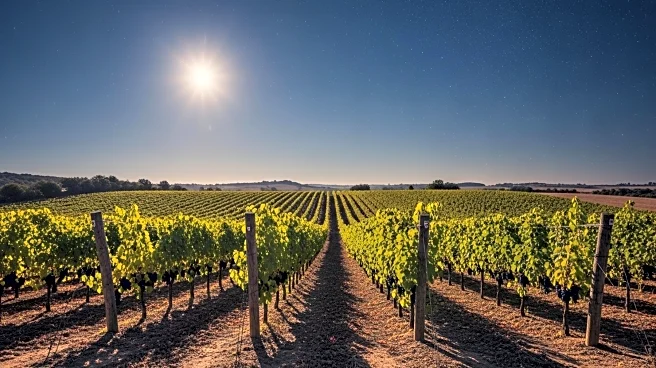What is the story about?
What's Happening?
In Portugal's Alentejo region, vineyards are increasingly adopting night harvesting practices to mitigate the adverse effects of rising temperatures due to climate change. Traditionally, grape harvesting occurs during the day, but the prolonged and intense heat of Portuguese summers has prompted a shift to nighttime operations. This method helps preserve the freshness of grapes by avoiding the heat, sunlight, and oxidation that can occur during daytime harvesting. The Herdade Da Fonte Santa vineyard, managed by Bárbara Monteiro, began night harvesting in 2019, initially facing resistance from workers. However, the cooler temperatures and ability to enjoy daytime activities have made this schedule preferable for many. Night harvesting is not unique to Portugal; similar practices are observed in Spain and Italy, where vineyards have adapted to climate variations by harvesting early in the morning or at night.
Why It's Important?
The shift to night harvesting in Portugal highlights the broader impact of climate change on agriculture and viticulture. As temperatures rise, traditional farming practices are being reevaluated to ensure crop quality and sustainability. For the wine industry, maintaining grape quality is crucial for producing complex and flavorful wines. Night harvesting allows vintners to lock in vibrant flavors and prevent premature sugar maturity, which can lead to higher alcohol levels and less nuanced wines. This adaptation not only preserves the quality of the wine but also supports the economic viability of vineyards facing climate-related challenges. The practice underscores the need for innovative solutions in agriculture to address environmental changes and sustain production.
What's Next?
As climate change continues to affect global temperatures, more vineyards may adopt night harvesting or other adaptive practices to maintain crop quality. The success of these methods in Portugal could serve as a model for other regions experiencing similar climate challenges. Additionally, ongoing research into climate-resilient agricultural practices may lead to further innovations in viticulture and other sectors. Stakeholders, including vineyard owners, workers, and consumers, will likely continue to monitor and adapt to these changes, ensuring the sustainability of the wine industry in the face of environmental shifts.
Beyond the Headlines
The move to night harvesting in Portugal also raises questions about labor practices and worker conditions. While cooler temperatures may be more comfortable, working through the night can impact workers' health and social lives. Ensuring fair labor practices and adequate compensation for night shifts will be important as this practice becomes more widespread. Additionally, the cultural significance of traditional daytime harvesting may evolve as vineyards adapt to new methods, potentially influencing local customs and tourism related to wine production.















